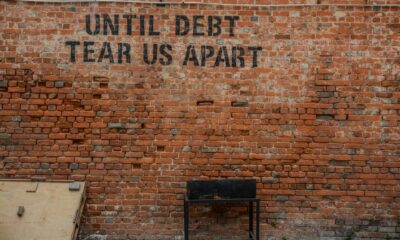Business
British Army engineer: Warfare lessons key to economic crisis survival
Fortitude, resilience, resourcefulness, and discipline learned in the battlefield can be used for business success.

Warfare survival lessons can help you endure and cope with the next financial or economic crisis. Thus writes Tom Stevenson, investment coordinator, in Fidelity International. He takes his cue from Nick Francis, a British military engineer who gave a TED talk on battlefield ordeals and uses them as a launchpad for lessons on business fortitude.
There are similarities between military campaigns and major socioeconomic collapses. Obviously, no matter how well or diligently you plan your strategies, something unforeseen can happen and throw your agenda in disarray. Damages of traumatic events like a stock market failure or the loss of revenue can be larger than initially forecasted.
Even though you might have anticipated and created contingencies for world-changing developments like Great Britain’s exit from Europe, some things which you had not expected can still crop up. Finally, like an enemy invasion, a debilitating financial or economic crisis can hit you when you least expect it. What’s worse is that your available resources might not be enough at the moment to turn the tide in your favor.
Four-step plan
Francis’ peppers his list of tips with examples from his own life-wrenching experiences on the battlefield. He emphasizes that there are times when one action or decision can save the day, or lose it. Still, the soldier must continually move and adapt to his situation. The more difficult it becomes, the more resilient and resourceful he has to be. The same holds true for the investor, entrepreneur, and business executive.
Remove your biases
Francis’ first advice is to discard or reject your own prevailing beliefs if they will limit your choices and narrow your perspective. Too often, people cling to their time-tested and well-worn paradigms because they are comfort zones. What worked in the past, though, may not succeed in the future.
For instance, the smashing of jets into two New York skyscrapers was unforeseen. Brexit was another. Business executives who see that their former strategies, corporate pillars, and other bedrocks of security had failed must be courageous enough to let go of them. Only then can they prompt themselves to find the real solution to the economic crisis.

Warfare lessons could be helpful in dealing with an economic crisis. (Source)
Assess the economic crisis objectively
Second, after discarding all preconceived notions, the business executive-cum-soldier can and must now look at the situation objectively. Casualties like financial goals that are currently hard to reach must be set aside. The present must be assessed without sentiment or drama.
Investors must ask themselves honestly: how badly am I hurt? What must I do to get out of this hole now? How fast can I do this? How can I work with limited funding and personnel?
Decide on the best response
Following that, the next step would be to evaluate how best to respond to the economic crisis. Consider all options, no matter how seemingly remote or quirky. You have to work with existing resources, no matter how scarce. Quickly analyze what you have and what you need. Events in crises move fast and people caught up in them do not have the luxury of time.
Implement the solution
Finally, after deciding on a solution, execute or implement it immediately. At the same time, you have to be open to changing some of your tactics if the occasion calls for it. Crises spawn mini-shock waves. What will you do if your expected venture capitalist does not come through? How can you continue operations if your best executive suddenly jumps ship and transfers to the competition?
An economic crisis is like fighting in a combat zone. A cool head, clear thinking, the resolve to act, and speedy smart decisions can win you the war.

-

 Impact Investing4 days ago
Impact Investing4 days agoBNP Paribas Delivers Record 2025 Results and Surpasses Sustainable Finance Targets
-

 Biotech2 weeks ago
Biotech2 weeks agoTwogee Biotech Advances Industrial Enzyme Solutions for Circular Production
-

 Crypto1 day ago
Crypto1 day agoUniswap and BlackRock Partner to Launch BUIDL in DeFi
-

 Cannabis1 week ago
Cannabis1 week agoScientifically Verified F1 Hybrids Set New Benchmark for Indoor Cannabis Yield and Consistency








![Kevin Harrington - 1.5 Minutes to a Lifetime of Wealth [OTC: RSTN]](https://born2invest.com/wp-content/uploads/2023/12/kevin-harrington-400x240.jpg)
![Kevin Harrington - 1.5 Minutes to a Lifetime of Wealth [OTC: RSTN]](https://born2invest.com/wp-content/uploads/2023/12/kevin-harrington-80x80.jpg)















You must be logged in to post a comment Login